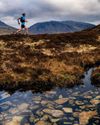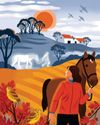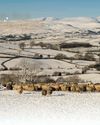Intentar ORO - Gratis
How horses shaped Britain
BBC Countryfile Magazine
|September 2023
The countryside would look very different were it not for equines. Tiffany Francis-Baker reveals some of the surprising ways horses have sculpted our landscapes

At close quarters, the Uffington White Horse could be any other path scratched into the Oxfordshire hillside. Those bright chalk lines, pressed into the earth by human hands, are designed to be seen from far away. Across the Vale, it is much easier to make out the strange beaked horse over 100 metres long, galloping over the hill.
This is one of a handful of chalk figures scattered across the British landscape, and it has been so well cared for in its 3,000-year lifespan that it had to be covered in turf during the Second World War so Luftwaffe pilots couldn't use it for navigation.
Why a community of Bronze Age Britons went to the trouble of making it is still unclear, but of all the animals to appear in prehistoric imagery, the horse is one of the most common. Our ancient ancestors obviously venerated horses. Later, the Anglo-Saxons used at least 16 Old English words for horses, each distinguishing between those used for carts, luggage, riding, breeding, royalty and war. So what is it about this animal, this half-tamed hybrid of pet, tool and vehicle, that has captivated the people of Britain for thousands of years?
AGE OF THE HORSE
The earliest known ancestors of the modern horse were small, dog-sized creatures that lived in North America around 55 million years ago. They first arrived in Europe by crossing the Beringia Land Bridge, a grassland steppe between Russia and Alaska that was exposed during the last Ice Age, enabling plants, animals and humans to migrate back and forth across the two continents. But it was not until the last 150,000 years that a relationship formed between humans and horses.

Esta historia es de la edición September 2023 de BBC Countryfile Magazine.
Suscríbete a Magzter GOLD para acceder a miles de historias premium seleccionadas y a más de 9000 revistas y periódicos.
¿Ya eres suscriptor? Iniciar sesión
MÁS HISTORIAS DE BBC Countryfile Magazine

BBC Countryfile Magazine
Manors and meadows
This December marks 250 years since Jane Austen's birth. To celebrate, Jack Watkins ambles around Chawton, where the writer penned novels that changed fiction forever
7 mins
December 2025

BBC Countryfile Magazine
TOP 10 ROYAL RESIDENCES
Castles, palaces and stately homes open a window into the history and private lives of the British monarchy
9 mins
December 2025

BBC Countryfile Magazine
Your countryside
HAVE YOUR SAY ON RURAL ISSUES
1 mins
December 2025

BBC Countryfile Magazine
Community spirit
Rural pubs across Britain are closing at an alarming rate - but local people are fighting back to save inns that have been at the hearts of their villages for centuries. Vivienne Crow orders a pint
4 mins
December 2025

BBC Countryfile Magazine
Gift ideas for nature lovers
Find inspirational and thoughtful presents for all the family in our pick of top outdoor gear and a round-up of this year's best nature and wildlife books
2 mins
December 2025

BBC Countryfile Magazine
Toad numbers are in freefall.It's in our power to save them
After becoming engaged at Christmas in 1998, my new fiancé and I were confronted by an enormous toad on the way to meet the vicar.
2 mins
December 2025

BBC Countryfile Magazine
Conquer fell running
Infamously tough yet famously friendly, the sport of fell running will take your fitness to new heights amid the wildest landscapes. Here's our beginners' guide
3 mins
December 2025

BBC Countryfile Magazine
A glorious haunting
They lived in the same village and shared the same dreams – just 60 years apart.
6 mins
December 2025

BBC Countryfile Magazine
The big questions answered
Across the UK, but particularly in the southeast of England, giant and featureless buildings are springing up.
13 mins
December 2025

BBC Countryfile Magazine
Away in a manger
While most of us down tools and pick up the mince pies, a farmer's work doesn't stop for the festive break.
5 mins
December 2025
Translate
Change font size
